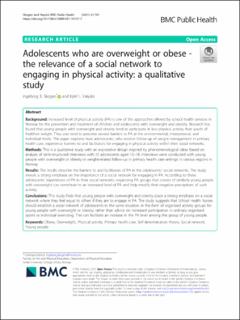| dc.contributor.author | Skogen, Ingeborg Berg | |
| dc.contributor.author | Høydal, Kjetil L | |
| dc.date.accessioned | 2022-11-29T13:34:42Z | |
| dc.date.available | 2022-11-29T13:34:42Z | |
| dc.date.created | 2021-04-09T13:56:12Z | |
| dc.date.issued | 2021 | |
| dc.identifier.citation | BMC Public Health. 2021, 21 (1), 701-?. | en_US |
| dc.identifier.issn | 1471-2458 | |
| dc.identifier.uri | https://hdl.handle.net/11250/3034777 | |
| dc.description.abstract | Background
Increased level of physical activity (PA) is one of the approaches offered by school health services in Norway for the prevention and treatment of children and adolescents with overweight and obesity. Research has found that young people with overweight and obesity tend to participate in less physical activity than youth of healthier weight. They also tend to perceive several barriers to PA at the environmental, interpersonal, and individual levels. This paper explores how adolescents’, who receive follow-up of weight management in primary health care, experience barriers to and facilitators for engaging in physical activity within their social networks.
Methods
This is a qualitative study with an explorative design inspired by phenomenological ideas based on analysis of semi-structured interviews with 10 adolescents aged 13–18. Interviews were conducted with young people with overweight or obesity in weight-related follow-up in primary health care settings in various regions in Norway.
Results
The results describe the barriers to and facilitators of PA in the adolescents’ social networks. The study reveals a strong emphasis on the importance of a social network for engaging in PA. According to these adolescents’ experiences of PA in their social networks, organizing PA groups that consist of similarly young people with overweight can contribute to an increased level of PA and help modify their negative perceptions of such activity.
Conclusions
This study finds that young people with overweight and obesity place a strong emphasis on a social network where they feel equal to others if they are to engage in PA. The study suggests that School Health Nurses should establish a social network of adolescents in the same situation, in the form of organized activity groups for young people with overweight or obesity, rather than advice on increased participation in ordinary organized sports or individual exercising. This can facilitate an increase in the PA level among this group of young people. | en_US |
| dc.language.iso | eng | en_US |
| dc.title | Adolescents who are overweight or obese - the relevance of a social network to engaging in physical activity: a qualitative study. | en_US |
| dc.type | Peer reviewed | en_US |
| dc.type | Journal article | en_US |
| dc.description.version | publishedVersion | en_US |
| dc.source.volume | 21 | en_US |
| dc.source.journal | BMC Public Health | en_US |
| dc.source.issue | 1 | en_US |
| dc.identifier.doi | 10.1186/s12889-021-10727-7 | |
| dc.identifier.cristin | 1903228 | |
| cristin.ispublished | true | |
| cristin.fulltext | original | |
| cristin.qualitycode | 1 | |
